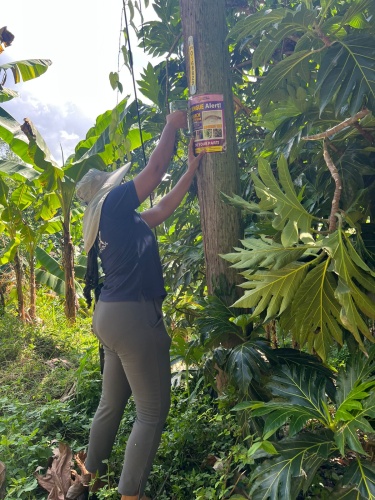Hanover Health Dept. Steps Up Action Against Dengue
By: , February 7, 2024The Full Story
The Hanover Health Department has intensified its action against the spread of dengue fever in the parish, through a comprehensive programme aimed at increasing public awareness of preventive measures against the disease.
This effort is also focused on eliminating the breeding sites of the Aedes aegypti mosquitoes, vectors of the disease.
Medical Officer of Health for the parish, Dr. Kaushal Singh, told a recent meeting of the Hanover Municipal Corporation that the department has stepped up the drive to rid communities of the Aedes aegypti mosquito in response to the increasing number of dengue fever cases diagnosed over recent months.
Ministry of Health statistics show that Hanover ranks fourth among the parishes with suspected and confirmed cases.
“The Hanover Health Department has been monitoring dengue notification and vector indices on a daily basis. Year to date (end of the first week in January 2024) the total number of notifications of suspected dengue cases received was 690. Out of them, more than 82.4 per cent were treated as outpatients, while confirmed positives were 5.4 per cent (a total of 37 cases),” Dr. Singh reported.
Senior Public Health Officer, Andrene Smith-Benjamin, told JIS News that over recent months, the department has taken its campaign to schools, homes and business places in communities across the parish.
She said that among the high-risk communities being targeted are Brissett, Cascade, Jericho, Cacoon, Mount Peto and Cacoon-Dias.
Health inspectors and health workers have been treating potential breeding sites, and have been distributing Natular DT tablets, bi-layer tablets that prevent mosquito breeding in standing water sites indoor and outdoor.

Mrs. Smith-Benjamin said that residents are being encouraged to use mesh covering over water drums.
At the onset of symptoms, persons are advised to see their primary healthcare practitioner (doctor) or to visit their nearest health clinic.
“Until they do, patients are to keep themselves hydrated by drinking plenty of water and fluids. Get as much rest as possible. Treat pain with acetaminophen (like Panadol/Panadeine) only, and do not take ibuprofen (like Advil) or aspirin, as this can increase their risk of life-threatening internal bleeding in case they have contracted the haemorrhagic strain of dengue fever,” Mrs. Smith-Benjamin advised.
In a news release, the Ministry of Health and Wellness reported that as of Thursday, January 11, 2024, the country had on record 1,534 confirmed dengue cases.
It states that “while Dengue Serotypes 2, 3 and 4 have been identified among the population, Dengue Serotype 2 (with the potential to cause dengue haemorrhagic fever), remains the dominant strain. At the same time, there have been a total of 19 dengue-related deaths – 13 classified as suspected and six as confirmed”.
Kingston & St. Andrew has reported the highest number of cases (1,499) for 2023.
However, St. Thomas continues to be the parish with the highest rate of 696.1 cases per 100,000 population, followed by Trelawny (551.7) and Hanover with 497.5 per 100,000.
The highest number of dengue cases (islandwide) continues to be observed in the five to 14-year-old cohort at a rate of 885.3 cases per 100,000 population.



